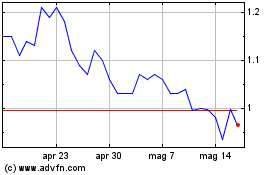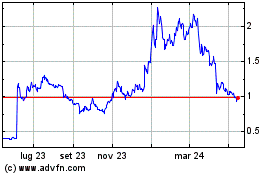Historical Trends Show What To Expect For Bitcoin Price Following The Halving
17 Aprile 2024 - 10:00PM
NEWSBTC
The 2024 Bitcoin halving is only two days away, and there are
already varying expectations of what might happen to the BTC price
once the event is completed. One way to get an idea of how it could
play out for the Bitcoin price, though, is through historical data
and how the cryptocurrency has performed at times like these.
Bitcoin Price Trends For Previous Halvings There have been three
halvings so far since Bitcoin was first launched in 2009 and with
each one, Bitcoin has demonstrated various reactions to the event.
The first halving took place on November 28, 2012, the second
happened on July 9, 2016, and the last one was on May 11, 2020.
Related Reading: Arbitrum’s Massive $107 Million Token Unlock
Threatens To Send Price Below $1 For the purpose of this report,
only the last two halving will be referenced given that adoption
had began to climb at the time that these two happened. The 2016
halving happened when Bitcoin was trading around $650, but in the
weeks following the halving, the BTC price would drop another 30%,
reaching as low as $460 before climbing back up once again. BTC
price crashed 30% post-halving in 2016 | Source: Tradingview.com
Then, during the 2020 halving, the BTC price was trending just
under $10,000, and following the halving, would see a drop in price
as well. However, this drop was not as significant as the 2016
drop, with the BTC price only falling around 15% during this time.
BTC price crashed 15% post-halving in 2020 | Source:
Tradingview.com This has formed quite a trend with the halving,
where the Bitcoin price falls after the event, which is
expected to be bullish. Therefore, if this trend continues, then
BTC could see a sharp drop in price despite the expectation that
the halving will be bullish for price. However, it is important to
consider that subsequent halvings have seen a lower post-halving
crash compared to their predecessors. So, if this holds this year,
Bitcoin could still be looking at a crash but to a much lesser
degree. For example, the 2020 post-halving crash was half of the
2016 post-halving crash, so holding this trend, the crash this time
around could only be an around 7-8% crash. BTC Deviates From
Established Halving Trends While the historical data does suggest
where Bitcoin could be headed following the crash, it is also
important to note that the digital asset has deviated from a number
of pre-halving trends. One of these deviations is the fact that the
Bitcoin price hit a new all-time high before the halving, something
that has never happened before. This could suggest that there will
be a complete deviation from these established trends, meaning that
a crash may not follow the halving after all. Related Reading: XRP
Price Set For 3,000% Rally To $22, Analyst Predicts Another
deviation is that the few weeks leading up to the last two Bitcoin
halvings have been green. However, in 2024, the last three weeks
leading up to the halving have been red as the BTC price has been
in decline. This also lends credence to the fact that there could
also be a deviation from its post-halving trends. One thing to keep
in mind though, is that the crypto market has always been uncertain
and Bitcoin has a habit of doing what no one expected. The Bitcoin
Fear & Greed Index has seen a pull back from the extreme greed
territory, but it continues to remain in greed, which means
investors are still bullish. In this case, if Bitcoin were to do
the opposite of what is expected, then it could follow the
established trend and crash back down. BTC deviates from
pre-halving trend | Source: BTCUSD on Tradingview.com Featured
image from Adobe Stock, chart from Tradingview.com
Grafico Azioni Arbitrum (COIN:ARBUSD)
Storico
Da Dic 2024 a Gen 2025

Grafico Azioni Arbitrum (COIN:ARBUSD)
Storico
Da Gen 2024 a Gen 2025
